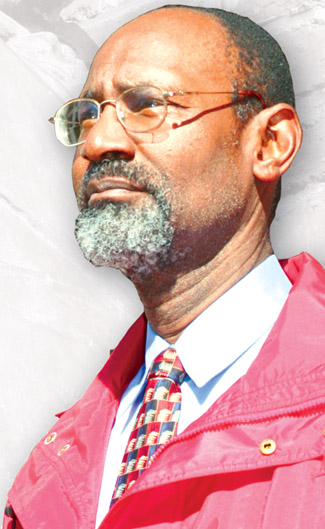Tuskegee Professor Knows Value of Sweet Service

He was just finishing up his doctoral work at the University of Illinois when a job board posting — an assistant professorship vacancy in the Department of Agricultural Sciences at Tuskegee Institute — caught the young scholar’s eye.”I stopped cold in my tracks, and knew that was going to be it,” Dr. Walter Hill recounted. “I mean God spoke that day, and that was the way it was going to be. “The choice of coming to Tuskegee was a calling because it wasn’t a place that had the best labs and the most money and the most modern facilities, but its real resource was its people — students and the colleagues. We just got together and made little miracles….It was a place where I clearly could make a difference. The rest is history. It’s been a great opportunity to serve others.”It’s that spirit of service, of desiring to better the lives of others, that earned Hill the Alabama Farmers Federation’s Service to Agriculture Award, presented during its 84th Annual Meeting in Mobile last month. Dean of the College of Agricultural, Environmental and Natural Sciences since 1996, Hill says his relationships with colleagues at nearby Auburn University formed the basis for some outstanding research opportunities. “Those colleagues were so important because I needed that infrastructure support and everybody was so open and friendly to me at that time,” said Hill. “That’s why I knew God had sent me here. When things open up that hadn’t been that way before, that’s when you know for sure that God was in it.”Before long, Hill was named director of the George Washington Carver Agricultural Experiment Station. Following in the footsteps of the visionary scientist for whom the facility was named, Hill immersed himself in Carver’s work.”I was aware of Dr. Carver, of course, but I had not studied him in much detail at all,” said Hill. “But when I came here, I studied him intensely the first year and really became aware of, more than anything else, his spirit and his connection with nature and his love of God and his sincere search for the secrets that nature holds, and finally, how he really cared about applying what he learned in the laboratory to help the lives of people in the communities. He went out and helped them plant crops, helped them make paint, and even taught them how to store sweet potatoes.”Ah, yes, sweet potatoes.Long a staple of Carver’s research, sweet potatoes and peanuts continue to play a major role at the experiment station even 63 years after his death. Only now it’s Hill who wears the mantle, taking his predecessors’ research on the two crops to new levels Carver could only have imagined as director of the National Aeronautics and Space Administration’s Center for Food & Environmental Systems for Human Exploration of Space.When NASA considered dropping the sweet potato from its list of crops being studied for use in long-term space missions, Hill and his colleagues went to work. Their research, detailed in a 1984 book co-edited by Hill, convinced NASA that the sweet potato was still one of the best candidates for space because of its viability and versatility.As a result, NASA began writing the crop into its long-term manned space missions with far-reaching implications for astronauts to grow their own food supply.”You could store food when you got there, but the question was how to sustain the food system after you got there,” said Hill. “How could you grow the crops? With or without soil? We had to think of every kind of possibility in a closed system.”In doing so, Hill and his colleagues co-invented and co-patented the system for successful sweet potato storage and root enlargement in a soilless system and developed protocols for growing, processing and utilization of sweet potato and peanut as foods for long-term missions.That research has given way to a host of food products, adding to the already long list first begun by Carver himself. Among the more intriguing foodstuffs is a beverage that is 38 percent sweet potato, and a pellet-shaped ready-to-eat breakfast cereal made from sweet potato.Those successes have led NASA to ask Hill’s teams of researchers to begin research on the space-worthiness of carrots and some herbs such as dill.”When you talk about Walter Hill, you have to talk about the colleagues,” Hill said. “As far as I’m concerned, none of this is possible without God and number two, my colleagues with whom I’ve worked all these years.”Despite his successes in space research, Hill hasn’t lost sight of the work to be done here on planet Earth. In addition to overseeing the Carver station’s 3,800 acres of research land and 9,000 square feet of greenhouse facilities and other labs, Hill stays busy trying to improve the lot of poor black farmers in Alabama’s Black Belt region through his work on the Black Belt Community Foundation and the Black Belt Action Commission.
There’s also the Boy Scout Troop he leads, the radio ministry he works with at his church, and the team-building with the Alabama Agricultural Land Grant Alliance.”The heart and soul of my experience of working at Tuskegee has been working with the students,” he said. “They’ve just been wonderful.” And, of course, there’s his wife, Jill, of whom he says, “I’m so thankful for her. I’m so glad my wife puts up with me.”
Hill’s spirit of service is one that Carver himself would have no doubt admired. In fact, Carver said it best many years ago: “It’s not the style of clothes one wears, neither the kind of automobile one drives, nor the amount of money one has in the bank, that counts. These mean nothing. It is simply service that measures success.”
